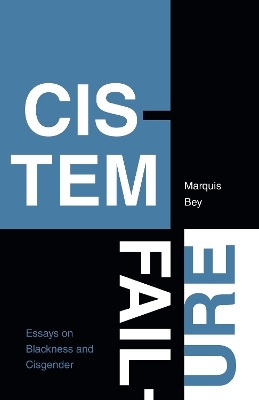
Cistem Failure
Essays on Blackness and Cisgender
Seiten
2022
Duke University Press (Verlag)
978-1-4780-1580-2 (ISBN)
Duke University Press (Verlag)
978-1-4780-1580-2 (ISBN)
Marquis Bey meditates on the antagonistic relationship between blackness and cisgender, showing that as a category, cisgender cannot capture how people depart from gender alignment and its coding as white.
In Cistem Failure Marquis Bey meditates on the antagonistic relationship between blackness and cisgender. Bey asks, What does it mean to have a gender that “matches” one’s sex---that is, to be cisgender---when decades of feminist theory have destroyed the belief that there is some natural way to be a sex? Moving from the The Powerpuff Girls to the greeting “How ya mama’n’em?” to their own gender identity, Bey finds that cisgender is too flat as a category to hold the myriad ways that people who may or may not have undergone gender-affirmative interventions depart from gender alignment. At the same time, blackness, they contend, strikes at the heart of cisgender’s invariable coding as white: just as transness names a non-cis space, blackness implies a non-cis space. By showing how blackness opens up a way to subvert the hegemonic power of the gender binary, Bey makes a case for an antiracist gender abolition project that rejects cisgender as a regulatory apparatus.
In Cistem Failure Marquis Bey meditates on the antagonistic relationship between blackness and cisgender. Bey asks, What does it mean to have a gender that “matches” one’s sex---that is, to be cisgender---when decades of feminist theory have destroyed the belief that there is some natural way to be a sex? Moving from the The Powerpuff Girls to the greeting “How ya mama’n’em?” to their own gender identity, Bey finds that cisgender is too flat as a category to hold the myriad ways that people who may or may not have undergone gender-affirmative interventions depart from gender alignment. At the same time, blackness, they contend, strikes at the heart of cisgender’s invariable coding as white: just as transness names a non-cis space, blackness implies a non-cis space. By showing how blackness opens up a way to subvert the hegemonic power of the gender binary, Bey makes a case for an antiracist gender abolition project that rejects cisgender as a regulatory apparatus.
Marquis Bey is Assistant Professor of African American Studies and English at Northwestern University and author of several books, most recently Black Trans Feminism, also published by Duke University Press.
Preface. Cistem Failure ix
Acknowledgments xvii
Back in the Day 1
Heart of Cisness 21
How Ya Mama’n’em? 47
Notes on (Trans)Gender 61
Blowing Up Narnia 87
RE: [No Subject] 105
The Coalition of Gender Abolition 129
Notes 147
Bibliography 153
Index 161
| Erscheinungsdatum | 17.08.2022 |
|---|---|
| Reihe/Serie | ASTERISK |
| Verlagsort | North Carolina |
| Sprache | englisch |
| Maße | 140 x 216 mm |
| Gewicht | 340 g |
| Themenwelt | Geschichte ► Teilgebiete der Geschichte ► Kulturgeschichte |
| Sozialwissenschaften ► Ethnologie | |
| Sozialwissenschaften ► Soziologie | |
| ISBN-10 | 1-4780-1580-2 / 1478015802 |
| ISBN-13 | 978-1-4780-1580-2 / 9781478015802 |
| Zustand | Neuware |
| Haben Sie eine Frage zum Produkt? |
Mehr entdecken
aus dem Bereich
aus dem Bereich
der stille Abschied vom bäuerlichen Leben in Deutschland
Buch | Hardcover (2023)
C.H.Beck (Verlag)
23,00 €
eine Geschichte der Welt in 99 Obsessionen
Buch | Hardcover (2023)
Klett-Cotta (Verlag)
22,00 €
Titel, Throne, Traditionen
Buch | Softcover (2023)
C.H.Beck (Verlag)
19,95 €


